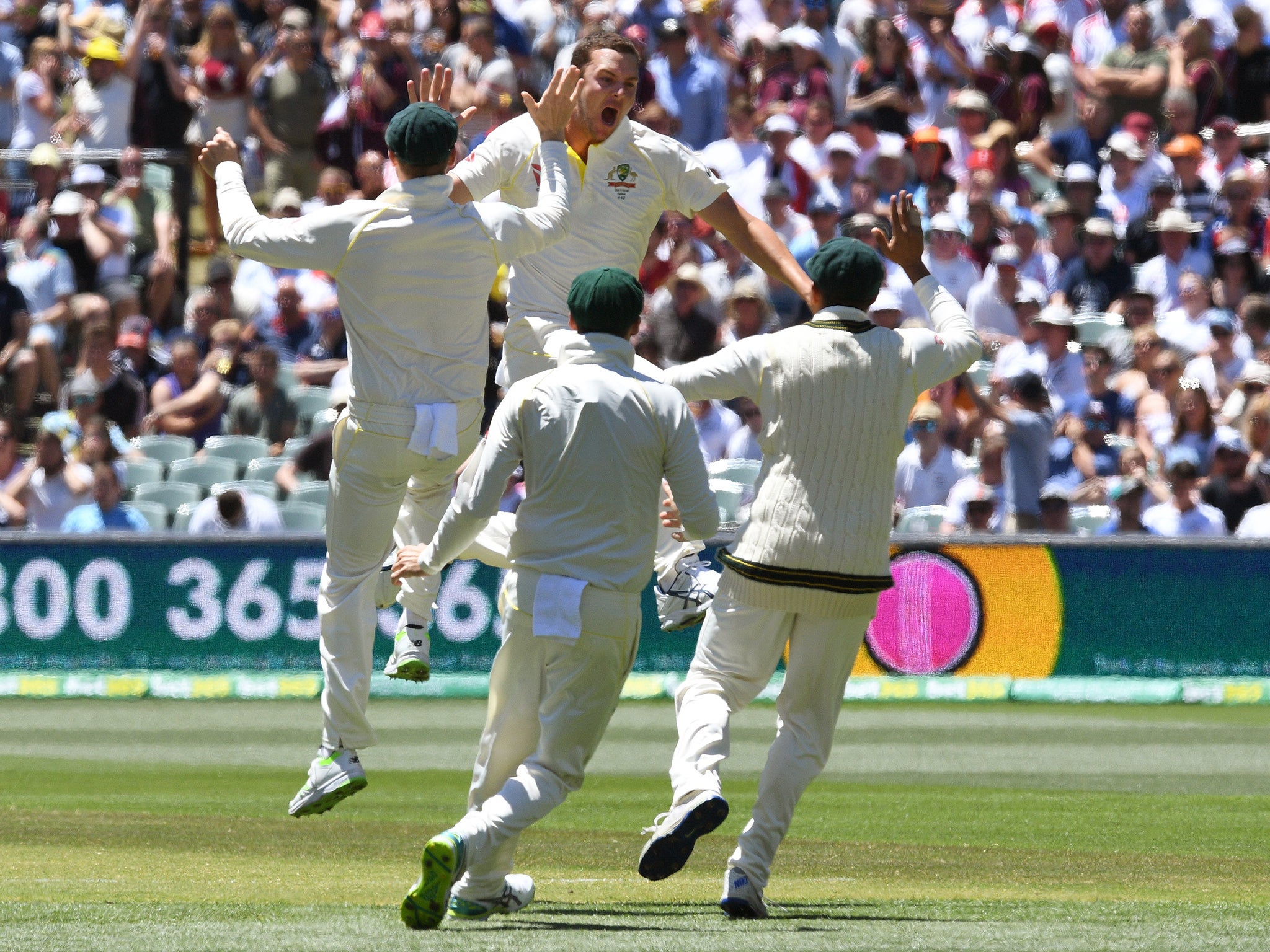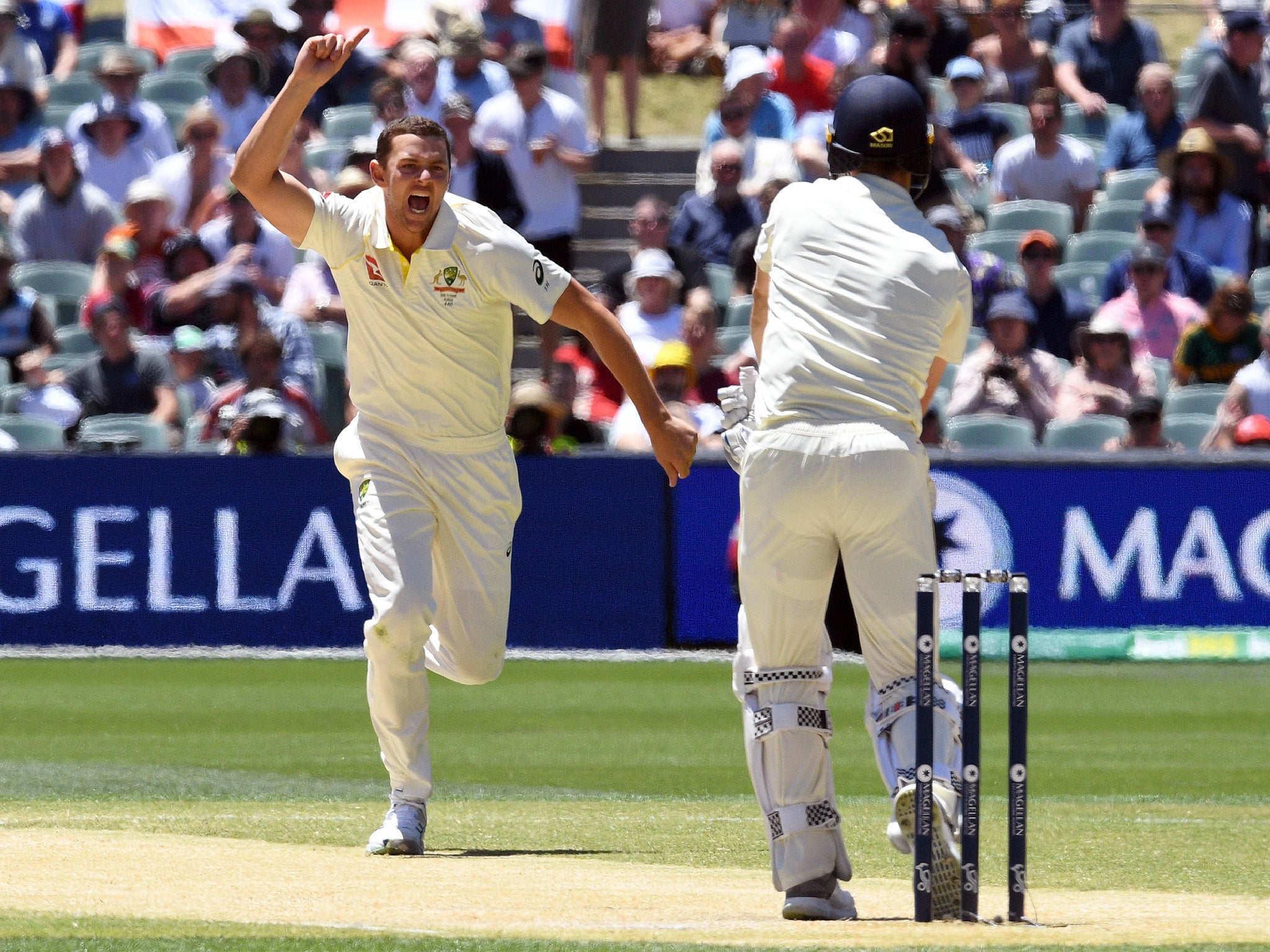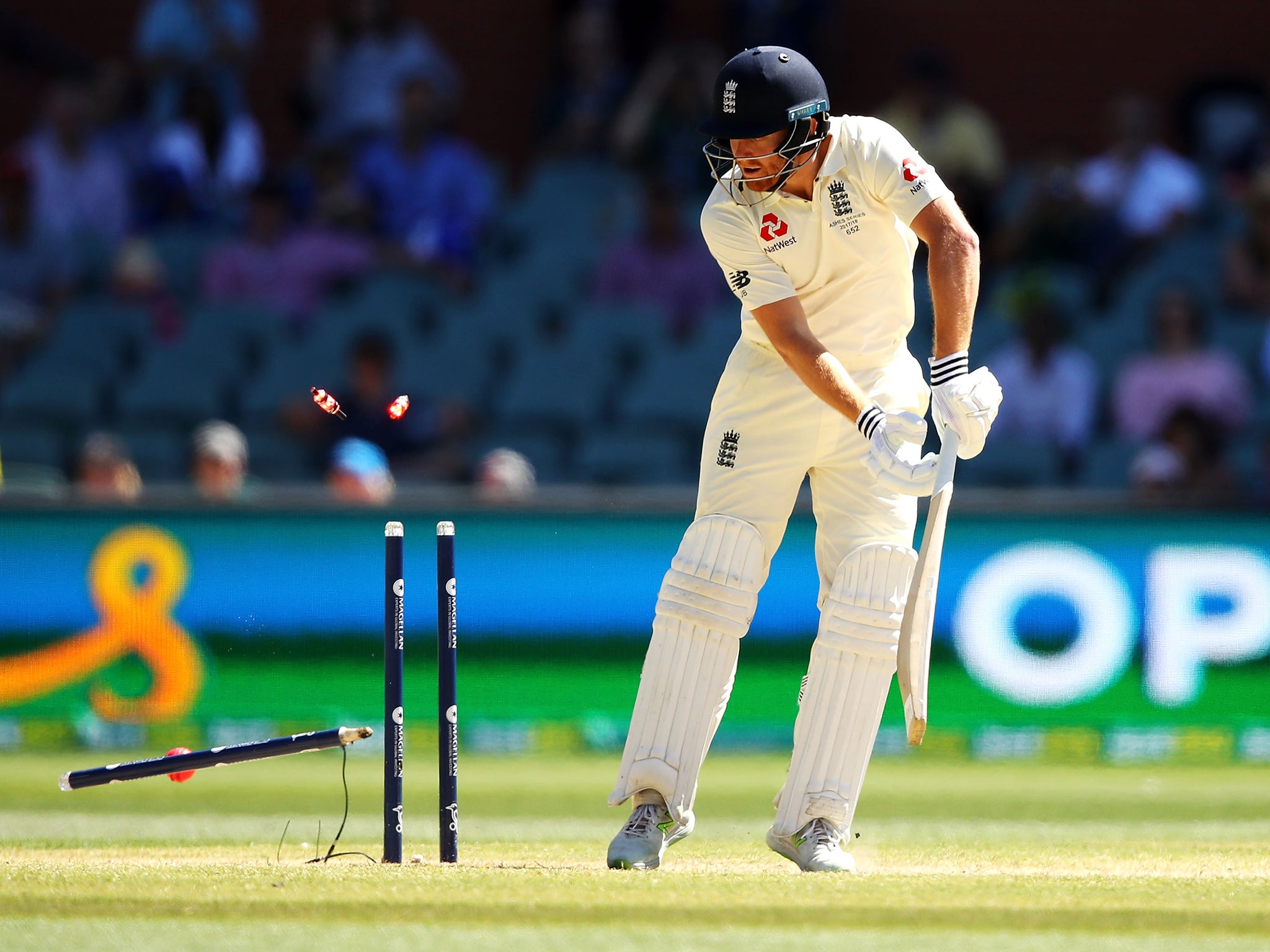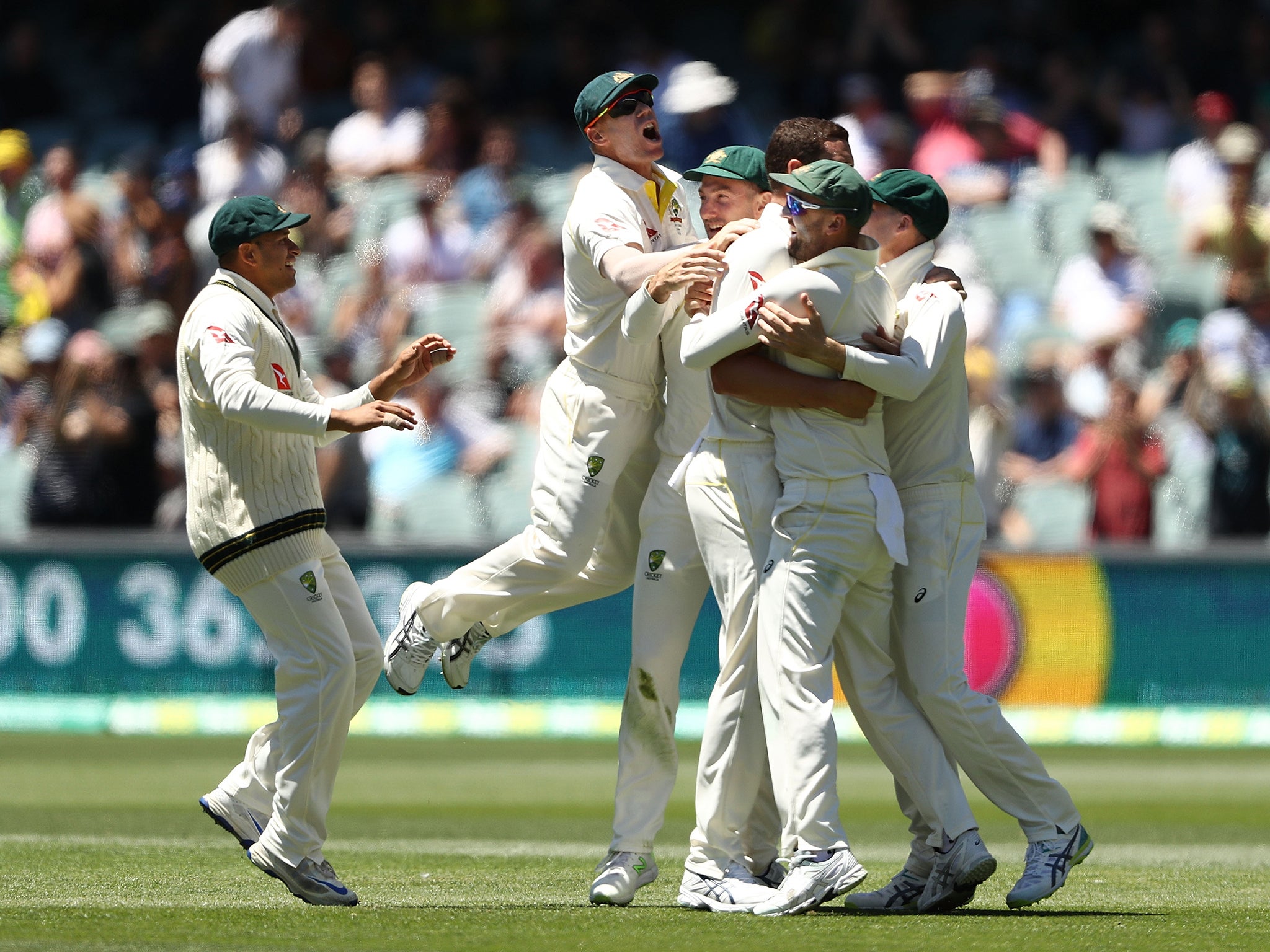Ashes 2017: Australia take 2-0 lead after inflicting 120-run second Test defeat to blow England away
Australia 442-8d & 138, England 227 & 233: Tourists add just 57 runs to overnight score after Joe Root and Chris Woakes fall early to trigger familiar collapse
Your support helps us to tell the story
From reproductive rights to climate change to Big Tech, The Independent is on the ground when the story is developing. Whether it's investigating the financials of Elon Musk's pro-Trump PAC or producing our latest documentary, 'The A Word', which shines a light on the American women fighting for reproductive rights, we know how important it is to parse out the facts from the messaging.
At such a critical moment in US history, we need reporters on the ground. Your donation allows us to keep sending journalists to speak to both sides of the story.
The Independent is trusted by Americans across the entire political spectrum. And unlike many other quality news outlets, we choose not to lock Americans out of our reporting and analysis with paywalls. We believe quality journalism should be available to everyone, paid for by those who can afford it.
Your support makes all the difference.Jonny Bairstow didn’t want to look back, but he couldn’t help himself. His other senses were already telling him everything he needed to know: the unsatisfying vibration of a thick inside edge in his hands, the sound of a stump being ripped from the ground, the sight of an entire stadium rising to its feet, Australian fielders swarming around him. The taste of defeat. The smell of disaster.
But he had to look behind him, just once, just to know, just to remember. It was worse than he would have hoped. Middle stump was out of its socket, lying forlornly some feet away. The bails, detached, no longer blinking. Nearby, the pink ball was still spinning, like an assassin admiring his handiwork. It had been a superb delivery from Mitchell Starc, and yet Bairstow had played a significant part in his own downfall. Kind of a microcosm for England.
“A Clear Blue Sky” is the name of Bairstow’s book, released earlier this year, and a clear blue sky was what greeted him now. Adelaide’s floodlights would not be required today. The chefs in the kitchens, busily preparing dinner, could take the rest of the day off. It was 4pm, we had been playing for less than a session, and the second Test was over.
At Brisbane, and in the days afterwards, Australia had singled out Bairstow for special treatment: ugly words, awkward questions, a whispering campaign carried out a remarkably short distance from the stump microphone. Now, as Bairstow walked off the field, he took one final look back. But the Australian players, wrapped tight in their victory huddle, no longer had any time for him. They were too busy being 2-0 up.
---
Chris Woakes defended the first ball of the day, from Josh Hazlewood, in bright sunshine. The Barmy Army were belting out Jerusalem. There were 20,000 in the ground to watch England’s tilt at history. It was the fifth day at the Adelaide Oval, and entry was just a dollar for charity.
Woakes took a stroll, returned to his crease, tapped his bat on the ground as he awaited the second delivery. It sounded like a knock at the door.

Since the close of play on Tuesday, social media had been swelling with optimism over England’s chances. Never mind that nobody had ever chased this many at Adelaide, let alone against a four-man attack without a single weak link. Never mind that the wicket of Dawid Malan late on the fourth evening had given Australia a vital hit of confidence. Believe, we thought. Be bold.
Hazlewood ran in to bowl the second ball of the day. A snick, a catch, a wicket. Turns out it was a knock at the door, except it was Australia who had been doing the knocking.
---
The ball, 63 overs old, was reverse-swinging. Already, Mitchell Starc had drawn a tasty leading edge. Root adjusted by shifting back in his crease, playing the ball as late as possible. The next ball from Hazlewood kept low. An inferior batsman would have jabbed at fresh air. Root was good enough to get the very end of his bat on it.

A click, like the cocking of a gun. A dull smack of leather on glove, like a muffled shot. Root went immediately and yet reluctantly, unfussily and yet with the slowness of a man in deep pain. It was his 47th half-century in Test cricket. Only 13 of them have resulted in centuries. Root kicked at the boundary rope as crossed it, like the off-duty comedian who sees the rake lying in front of him and, through force of habit, steps on it anyway.
---
If there was anyone who could be relied upon to play the situation and not the occasion, it was Moeen Ali. Unfortunately, it was the situation that was the problem. Nathan Lyon got him for the fourth time out of four, LBW as he tried to swipe across the line.

And that was that. England could afford one early wicket, but not three. It had taken 35 minutes, and three fingers from Aleem Dar, to expose the folly of their optimism. In retrospect, England’s players should probably have thrown a coin in the collection pot as they walked into the ground. They spent most of the day as little more than spectators.
---
Craig Overton watched the ball out of the hand, identified it as a bouncer, and began the not insignificant process of winching his 6ft 5in frame out of the way of the ball. As he was doing so, he spotted something out of the corner of his eye. The ball, though short, was not a bouncer at all. Overton had just a fraction of second to ponder this new information before the ball reared up and smacked him in the ribs.
Fortunately Overton was wearing a chest protector, and was able to carry on. He might have wished he wasn’t. During his half-hour at the crease, he scampered for a quick single and was hit by David Warner’s throw as he dived. He edged a ball that stopped just short of gully. He steered another ball that Cameron Bancroft dropped at third slip. He played and missed, and played and missed, again and again.
The first ball of the 81st over was also the first with the new ball. Starc ran in with lust and delivered a vicious inswinger that tailed into Overton’s pads. The sort of ball where you should probably offer the batsman a blindfold and a cigarette before delivering it, as a courtesy. It would scarcely have affected his chances of hitting it.

Overton reached forward like a man pushing at a wall, hoping it would be a door. England still had a review left, but Overton didn’t think once about taking it, let alone twice. He had enjoyed a mighty impressive debut – runs with the bat, wickets with the ball, success in the field. And yet he still couldn’t get off the field quick enough.
There’s more to Test cricket than tactics and numbers: how many you made, how you fielded, how many balls you put on the right spot. Fundamentally, it’s emotional. Overton discovered that here. Test cricket is a loaded jug, measuring your capacity for anguish.
---
Still, there was Bairstow. What was going through his mind? Not victory, surely, even he wasn’t that delusional. Throw the bat and have some fun? Plausible, if irresponsible. Stick around and see what happens? Well, he was already sticking around, and he had seen what happened.
The Barmy Army were still bellowing their songs. When you’re on top, when you’re fighting hard, the Barmies are an invaluable tool – a 12th man, as Root put it later. When you’re down, however, they are no use to you at all. They’re not really here for England’s benefit. They’re here for their own. Win, lose or draw: happy days. Roy Keane, you strongly suspect, would have absolutely loathed them.

Bairstow began the Test summer batting at No 5. He opens in one-day internationals. Now here he was at No8, batting with James Anderson, a guy who had claimed the previous evening that if he was walking in with England needing more than 10 to win, they were in trouble. Here, they needed 130.
England have three batsmen in their top five without a single Test century to their name. Bairstow, meanwhile, has a 140, a 150 and a 167, and was now almost out of partners before had reached 40. With the field up, he carved one boundary through the off-side. But when he tried to repeat the trick off Starc, the pop of the middle stump behind him – like a champagne bottle opening – gave him away. Bairstow has been at the crease for 73.4 overs in this series. He has spent 42 of them – more than half – batting with a bowler.
---
England arrived at the ground today thinking they were playing a wounded Australian team. Smith, it was widely held, was having a shocker, whether batting, catching or making that T-sign with his arms. The previous evening, their bowling coach David Saker – the mind behind England’s triumph here in 2010/11 – had essentially chucked Smith under the bus by admitting his declaration had been a mistake.
But in the warm Adelaide sunshine, Smith was not the one on trial. All he had to do was rotate his four bowlers and watch from a safe distance.
And I think, deep down, we all knew this was what would probably happen. Australia have wobbled at times this series, but one thing has been constant: their four-man attack, which has bowled immaculately, with hostility and skill. In Brisbane, when the ball was doing nothing, they peppered England with bouncers until they cracked. Here, with the ball doing plenty, they bowled not one single bouncer. Everything on a length: probing, searching, interrogating. It was magnificent. England’s totals this series – 302, 195, 227, 233 – represent a puzzle that they are still nowhere near solving.
And so England were blown away: by the lead-filled anvil of expectation, by the heavy artillery of Josh Hazlewood, by their own twanging nerves. They allowed themselves to believe, which is both a necessary and a dangerous thing in Test cricket. If you believe, then you are already focusing on the outcome. England have been doing a little too much of that on this tour.
The Ashes are almost certainly gone. And yet, England are still confident there are frailties in this Australia side, certain they can be conquered. That, at least, is the one big difference from four years ago, when the pall of calamity settled over the tour right from the start. And yet, maybe we are just quibbling over semantics here. After all, when you’re on a sinking ship, what does it matter whether you saw the iceberg coming or not?
Join our commenting forum
Join thought-provoking conversations, follow other Independent readers and see their replies
Comments